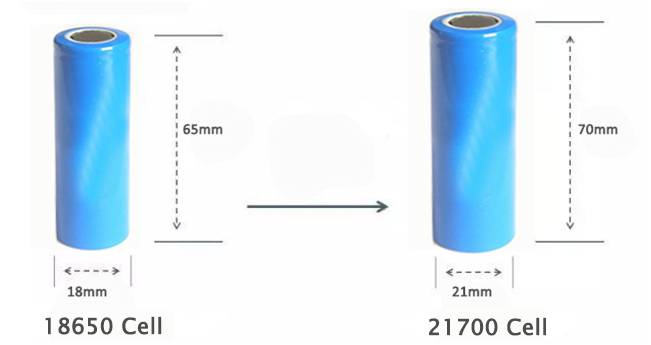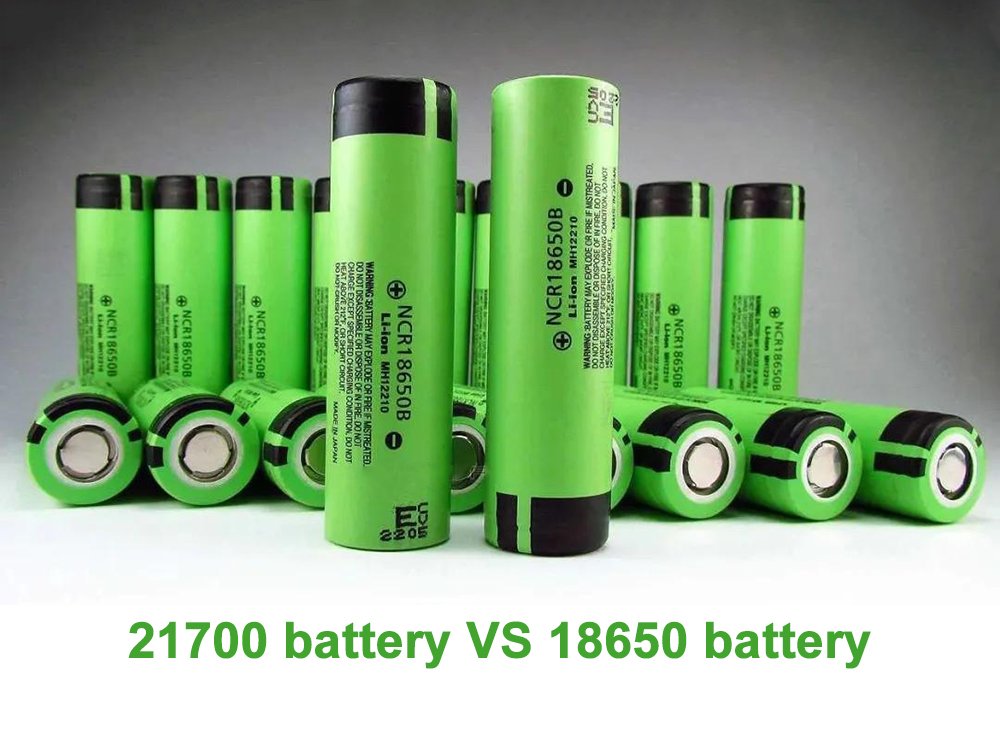There are several key similarities between 21700 vs 18650 batteries that make them both great options for LEV (lithium electric vehicle) batteries.
Firstly, both battery types have a high energy density, meaning that they can store a large amount of energy in a relatively small space. This makes them ideal for use in LEVs, where space is often at a premium.
Secondly, both battery types have a high discharge rate, meaning that they can provide the high levels of power required by LEVs. Thirdly, both battery types are relatively lightweight, making them easier to handle and install in LEVs.
Thirdly, both the 18650 battery and 21700 battery come with the same voltage, which is 3.7 volts. This is the standard voltage for LEV batteries, and it ensures that there are no compatibility issues between different battery types.
Fourthly, both 21700 and 18650 batteries can be used in a wide range of temperatures, making them suitable for use in a variety of climates. This means that they can be used in LEVs operating in a variety of conditions, including cold weather and hot weather.
Finally, both battery types have a long lifespan, meaning that they will not need to be replaced as often as other types of batteries. This makes them a more cost-effective option for LEV owners over the long term.
High Energy Capacity for 21700 Batteries
One of the most common features of 21700 batteries is their high energy capacity. The high energy density enables the battery to store more energy in a smaller physical space. This is important for LEVs because it means that the battery can be made smaller and lighter, making the LEV more efficient.
Instead of having a huge battery that takes up a lot of space and weighs the LEV down, you can have a smaller battery that has the same power output.
Major differences between 21700 vs 18650 batteries

There are many differences between 21700 and 18650 batteries. Some of these differences include:
Cell Voltage
One of the differences between 21700 and 18650 batteries is their cell voltage. 21700 batteries have a cell voltage of 4.2V, compared to 3.7V for 18650 batteries. This means that 21700 batteries have a higher cell voltage than 18650 batteries.
Discharge rate
The second difference between 21700 vs 18650 batteries is their discharge rate. 21700 batteries have a discharge rate of 30A, compared to 20A for 18650 batteries. This makes 21700 batteries have a higher discharge rate than 18650 batteries.
Charge Rate
The third difference between 21700 vs 18650 batteries is their charge rate. 21700 batteries have a charge rate of 2C, compared to 1C for 18650 batteries. The 21700 batteries can therefore be charged at a higher rate than 18650 batteries.
Battery weight
The fifth distinguishing factor between 18650 and 21700 batteries is their weight. 21700 batteries have a weight of 48g, compared to 60g for 18650 batteries. This means that 21700 batteries are lighter than 18650 batteries.
Self-Discharge Rate
The seventh factor that distinguishes 21700 from 18650 batteries is their self-discharge rate. 21700 batteries have a self-discharge rate of less than 3%, compared to 5% for 18650 batteries. This, therefore, means that 21700 batteries have a lower self-discharge rate than 18650 batteries.
Price
The eighth difference between 21700 vs 18650 batteries is the price of each. 21700 batteries are more expensive than 18650 batteries. This is because 21700 batteries are newer and have more features than 18650 batteries.
Energy Density
The final difference between 21700 vs 18650 batteries is their energy density. 21700 batteries have an energy density of 726Wh/L, compared to 620Wh/L for 18650 batteries. This means that 21700 batteries have a higher energy density than 18650 batteries.
Application of 21700 batteries
21700 batteries are commonly used in LEVs. This is because they have a high cell voltage, high discharge rate, and low self-discharge rate. 21700 batteries are also relatively lightweight, making them easier to handle and install in LEVs. 21700 batteries are also used in power tools and other devices that require a high level of power. This is because 21700 batteries can provide the high levels of power required by these devices.
Solar energy storage systems
21700 batteries are also used in solar energy storage systems. This is because 21700 batteries have a high charge rate and can be charged quickly. Solar energy storage systems require batteries that can be charged quickly to store the energy generated by solar panels.
Laptops
Over time, the size of laptops has reduced significantly. This has mainly been made possible due to the reduced size of 21700 batteries. 21700 batteries have a higher energy density than 18650 batteries. This means that their rechargeable lithium ion cells can store more energy resulting in a much smaller battery pack.
Electric Vehicles
The high cell voltage of 21700 batteries also makes them ideal for use in high-voltage applications such as electric vehicles. Electric vehicles require batteries that can store a large amount of energy to power the electric motors. The high-density li ion cells in 21700 batteries make them ideal for use in electric vehicles.
Medical Devices
21700 batteries are also used in medical devices. This is because 21700 batteries have a low self-discharge rate. This means that 21700 batteries can maintain their charge for a long period of time. Medical devices require batteries that can maintain their charge for a long period of time to ensure that the medical device is always ready for use.
Vapes
The use of vapes has increased the need for 21700 batteries. This is because 21700 batteries have a high discharge rate. The high discharge rate of 21700 batteries means that they can provide the high levels of power required by vapes.
Drones
Another application of 21700 batteries is in drones. Drones require batteries that can provide a high level of power for a long period of time. The high cell voltage and high discharge rate of 21700 batteries make them ideal for use in drones. Drones require light batteries that can store a large amount of energy. The lightweight li ion cells in 21700 batteries make them ideal for use in drones.
Application of 18650 batteries

The use of 18650 batteries is not as widespread as the use of 21700 batteries. This is because 18650 batteries are less powerful than 21700 batteries. 18650 batteries are commonly used in flashlights and other devices that require a lower level of power.
18650 batteries are also used in some LEVs. This is because they are less expensive than 21700 batteries. You may however notice that 18650 batteries are not as common in LEVs as 21700 batteries because they are less powerful.
18650 batteries are also used in some power tools. This may happen where a cheaper option for power is needed. 18650 batteries however may not be so common in power tools since they are less powerful compared to 21700 batteries.
Another important use of 18650 lithium ion batteries is laptops. Many laptops use 18650 batteries because they are powerful and have a long lifespan. Laptops require batteries that can provide a long runtime, and 18650 batteries can do this. 18650 batteries are made of rechargeable lithium ion cells that can be charged and discharged many times. This makes them ideal for use in laptops.
Vapes have become common in recent years, and some of them use 18650 batteries. This is because 18650 batteries are powerful and can provide the high levels of power required by vapes. As a user, you should however be aware that 18650 batteries can be dangerous if they are not used properly.
The rise in the use of Electric cars commonly known as EV’s has also increased the demand for 18650 batteries. The large battery capacity of 18650 batteries is ideal for electric cars since they require a lot of power.

